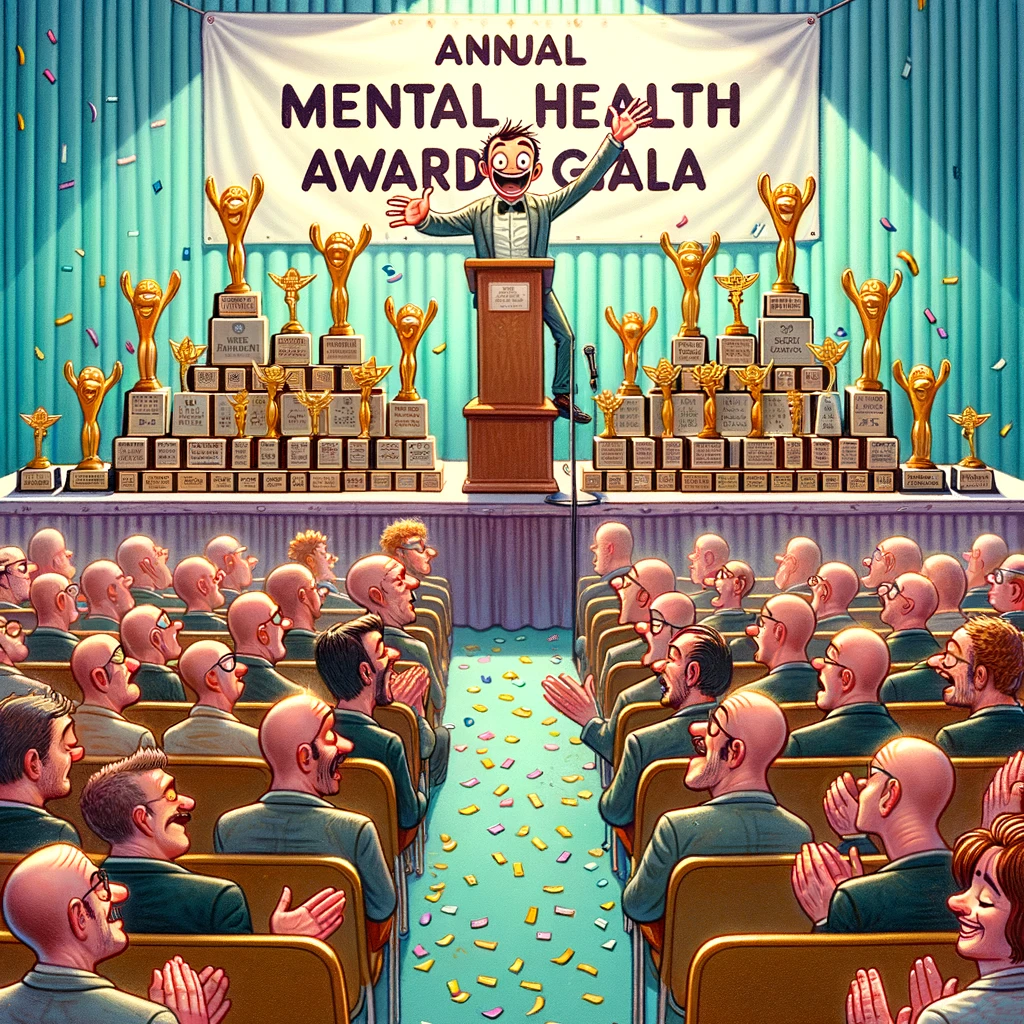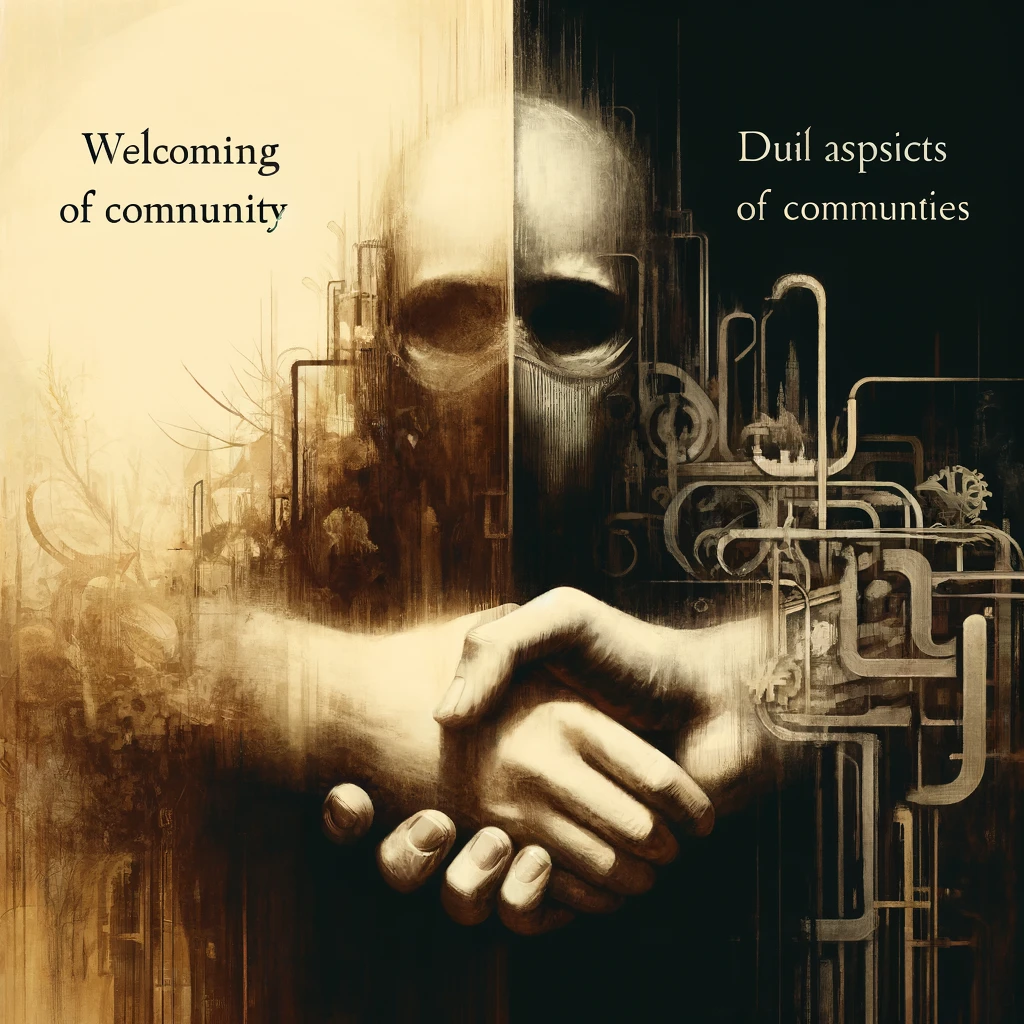Your cart is currently empty!

Same Trophy, Different Day: The Endless Echo of Awards in Mental Health Land
In the world of mental health awards, Harvey Rosenthal’s repeated victories shed light on celebrity influence, networking dynamics, and the industry’s preference for safe bets. This phenomenon brings attention to the need for a more diverse recognition system, challenging the status quo and providing opportunities for new faces to emerge from the shadows of perennial…
In the illustrious world of mental health, where every day feels like a Groundhog Day of accolades, the saga of Harvey Rosenthal, the grand poobah of the National Association for Praise and Recognition in Sanity (NAPRS), unfolds. It’s a tale that mixes the absurdity of an endless loop with the razor-sharp edges of satirical revelation, shedding light on the peculiar carousel of awards that seems to spin with the same faces year after year.
The Harvey Phenomenon
Enter Harvey Rosenthal, whose name is so engraved on mental health awards that conspiracy theorists whisper he’s actually a hologram invented by the award industry to save on plaque engraving costs. Harvey, with his uncanny ability to rack up lifetime achievement awards, has become the Leo DiCaprio of mental health—before Leo won his Oscar. Every year, as the NAPRS gala rolls around, the suspense is not about whether Harvey will win but how many speeches he’ll recycle from previous years.
The “Celebrity” Factor Redux
Harvey’s repeated victories are a testament to his undeniable contributions to the field and to the ‘Celebrity Factor’ gone wild. Like a blockbuster movie franchise that keeps churning sequels because the audience already knows the name, Harvey keeps collecting accolades because it’s hard to imagine a ceremony without him. It’s as if the awards have developed a peculiar form of Stockholm syndrome, finding comfort in the familiar.
Networking or Not Working?
The Harvey Rosenthal saga also peels back the curtain on the glittering world of mental health networking, where cocktail receptions might determine the next award winner. If mental health awards were high school superlatives, Harvey would perennially be voted “Most Likely to Succeed” simply because everyone knows his name from the last twenty yearbooks.
The Safe Bet Syndrome
The committee’s preference for Harvey highlights the industry’s love affair with the ‘safe bet.’ With his impressive resume that’s longer than a CVS receipt, Harvey represents the ultimate risk-averse selection. It’s as though the committees fear that recognizing a new name might unleash unknown horrors, like innovative ideas or fresh perspectives that challenge the status quo. Harvey is the comfort food of award nominees: predictable, reliable, and unlikely to cause indigestion.
The Harvey Loop
The feedback loop Harvey finds himself in is akin to being stuck in an echo chamber where the echoes all say, “Harvey, you genius!” This loop ensures new opportunities, speaking engagements, and collaborations flow towards him like a river, further cementing his place in the awards circuit. It’s a self-fulfilling prophecy where the prize is more prizes, creating a Möbius strip of recognition that’s both bewildering and slightly amusing.
Beyond the Harvey-verse
The Harvey Rosenthal phenomenon, while chuckle-worthy, subtly uncovers the absurdities and inequities of the current system of recognition in mental health. It begs for a reshuffling of the deck, a broadening of the horizon where new faces emerge from the shadow of the perpetual winners. Perhaps it’s time for NAPRS and similar entities to introduce awards like “Most Promising Newcomer” or “Best Supporting Therapist” to diversify the spotlight.
The Satirical Revelation
Harvey’s story is a comical mirror reflecting the quirks of the mental health awards scene, urging a reevaluation of what it means to recognize achievement and contribution. Maybe next year, NAPRS will surprise us all by awarding the “Lifetime Achievement Award for Not Being Harvey Rosenthal,” finally breaking the cycle and giving the underdogs their day in the sun. Until then, we’ll all be in the audience, popcorn in hand, waiting for Harvey’s acceptance speech and wondering if, maybe, this year, he’ll do a tap dance routine.





Leave a Reply